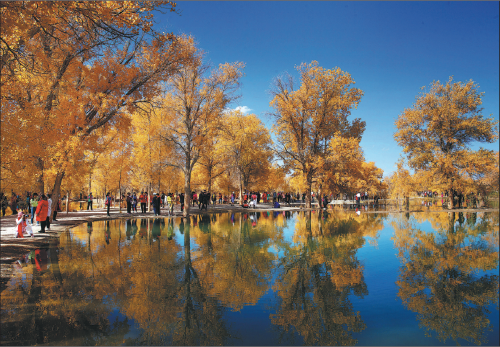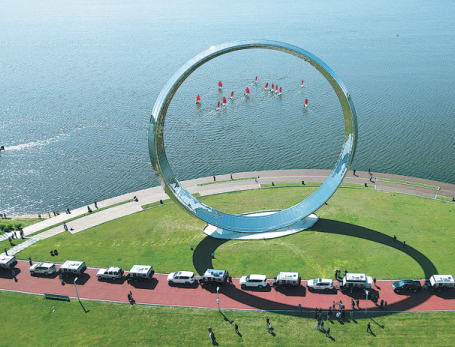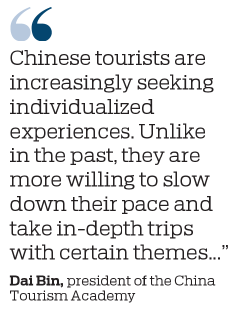HAVE ZEST, WILL TRAVEL

Golden Week boom promises to turn tourism into economic driver with new winter tours and services
On Thursday, when China's top leadership stressed that domestic consumption will anchor the nation's long-term plans for stable post-COVID-19 economic growth, executives of major tourism agencies were delighted as it confirmed that their recent shift in focus from overseas group tours to domestic tourism was timely and strategic.
For instance, Caissa Touristic, a Beijing-based travel agency, sees potential for big growth in domestic tourism, as China's new priorities under the "dual circulation" development pattern identify domestic consumption sectors, including tourism, as key to future growth.
The tourist rush seen during the eight-day holiday period in early October confirmed Caissa's view.
Although the haze of the epidemic has not yet completely dissipated, the Golden Week-the National Day and Mid-Autumn Festival holiday period-saw 660 million people travel across China, generating 549.4 billion yuan ($82 billion) in revenue for the domestic travel and tourism industry.
Bookings for tours, hotel rooms, domestic flights and passenger train seats/berths rebounded rapidly. The holiday rush took domestic tourism demand to pre-pandemic levels with 15 provinces notching up revenues of more than 10 billion yuan each during the period, according to the Ministry of Culture and Tourism.
With the gradual recovery of China's economy on the back of effective contagion-control measures, post-COVID-19 domestic travels have been on the rise, stoking enormous demand for tourism-related consumption from Chinese citizens as well as expatriates.
Subbarao Tata, Shanghai-based representative of an Indian chemical firm, said he and his wife Aruna spent around 25,000 yuan on a six-day group tour of the northeastern parts of the Inner Mongolia autonomous region organized by OK Deal, a travel firm, during the Golden Week.
"Every yuan we spent was well worth it because we got to travel after several months of being mostly indoors in Shanghai due to the epidemic. The landscapes and vistas were stunning with their autumn colors. The Sino-Russian border area of Shiwei near Erguna offered us some unique, unforgettable cultural experiences," said Subbarao.
"Our group of 12 comprised expatriates from the US, Guatemala, Argentina, Ukraine, Germany, India, Singapore and Canada, and it was wonderful for all of us to be able to appreciate spectacular natural beauty, experience local hospitality and savor Mongolian cuisine, including its fresh dairy products."
Tourism industry experts said travel demand will continue to rise to such levels the industry could emerge as one of the important drivers of the Chinese economy in the next five years.
Small wonder, Chinese travel agencies, flush with a successful Golden Week, are rolling up their sleeves to offer imaginatively conceptualized travel products for the approaching winter season.
Caissa said its winter travel products would focus on warm destinations such as Zhejiang, Hainan, Guangdong, and Fujian provinces.
Its tours will be themed on food, recreational vehicles or RVs, sports, and research and study trips. The firm will also introduce high-quality packages tailored for students and the elderly group.
Caissa said it will improve the quality of its travel products to make the most of the expected boom in domestic tourism.
Liang Qiulan, a research analyst of the LeadLeo Research Institute, a market research provider, said, "With effective epidemic-prevention measures, China's work and life have pretty much returned to normal. But, COVID-19 has not yet been effectively controlled overseas. This situation has expanded domestic demand, and it will prove to be important for China's economic recovery and future growth."
That is not an exaggeration as leisure trips have become something of a trend for Chinese travelers.
According to Trip.com Group, China's largest online travel agency, activities like driving luxury cars and RVs, aerial photography using drones (unmanned aerial vehicles), flights in hot air balloons, mini helicopters, two-seater aircraft, outdoor hiking, paragliding, and diving, are becoming popular.
During the weeklong break in early October, the number of tourists who rented cars for self-driving trips and who registered for small-scale private group tours on Trip.com Group surged 50 percent and 100 percent year-on-year, respectively. Trip.com, however, did not disclose the actual figures.
The growth rates indicate people's penchant for more personalized and distinctive experiences, Trip.com said.
Agreed Dai Bin, president of the China Tourism Academy. "Chinese tourists are increasingly seeking individualized experiences. Unlike in the past, they are more willing to slow down their pace and take in-depth trips with certain themes, encouraged by their growing spending power and evolving tastes."
A report by consulting firm McKinsey& Co said while the path of the travel and tourism recovery will vary by market, China's distinct experience may hold lessons for other countries.
For, in China, COVID-19 transmission rates are low and traveler confidence has recovered quickly.
The Ministry of Culture and Tourism said at a recent seminar that high-quality development of the culture and tourism industries will likely be a priority during the 14th Five-Year Plan (2021-25).
Under the new dual circulation development pattern, China will rely mainly on "internal circulation "or the domestic cycle of production, distribution, and consumption for its long-term development.
During the 14th Five-Year Plan period, consumption will continue to be an important starting point for expanding domestic demand.
UBS economists said China's total consumption is expected to hit $12 trillion in 2025. The country is seen to continue to be a main force driving global consumption growth.
The consumption upgrade drive, which started gathering momentum last year, is showing bright market prospects, said Wang Tao, chief China economist at Swiss bank UBS.
"Consumers will prefer more high-quality and premium products and services, increase their spending on healthcare, experiential and self-improvement-related services (including tourism), and online consumption (including that of travel products) is set to continue to grow," she said.
"We expect the penetration rate of China's online consumption to further increase from 25 percent seen in the first eight months of this year. Besides, the spending on online services such as video communication for work, online education, online healthcare and financial services, is also foreseen to grow rapidly in the next few years."
Last year, China's consumption expenditure contributed almost 58 percent of the country's economic growth. Consumption has become the top driver of China's economic growth for six consecutive years, according to the National Bureau of Statistics.
Six major industries-tourism, culture, sports, pensions, healthcare, and education-have shown considerable growth momentum. They have indicated a huge market growth potential, and tourism is one of the fastest-growing sectors among the six, according to LeadLeo.
For the tourism industry, social media will play an important role during the 14th Five-Year Plan period. Short videos, livestreamed promotions, and other marketing formats will intensify the allure of scenic spots and other sightseeing areas for travelers. Online and offline connections will integrate tourism into people's daily life and deepen their interest in travel, Lead-Leo said.
Liang of LeadLeo said: "Besides, during the period of epidemic prevention and control, some newly emerging consumption patterns in China have effectively boosted spending. They are helpful in activating more business opportunities. For instance, the rapid growth of online shopping for fresh food has made it possible for consumers to stay at home and shop conveniently.
"Meanwhile, other new business formats such as livestreamed promotions and group buying have offered new shopping experiences to consumers. They further satisfy consumers' demand for diversified and personalized experiences."
The advent of 5G telecommunication will further upgrade online tourism consumption, intelligent navigation and other functions, thanks to more mature applications of augmented reality, virtual reality and artificial intelligence technologies, which will likely attract more consumers to experience certain services like niche tourism, Liang said.
zhuwenqian@chinadaily.com.cn

























